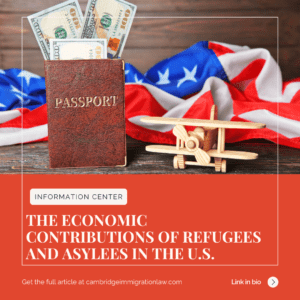THE ECONOMIC CONTRIBUTIONS OF REFUGEES AND ASYLEES IN THE U.S.
THE ECONOMIC CONTRIBUTIONS OF REFUGEES AND ASYLEES IN THE U.S.
A recent report by the U.S. Department of Health and Human Services (HHS) highlights the significant positive fiscal contributions made by refugees and asylees in the United States. According to the report, from 2005 to 2019, these individuals generated a net fiscal gain of $31.5 billion for the federal government and $92.3 billion for state and local governments combined. The study considered all refugees and asylees who arrived since 1980, emphasizing their substantial financial impact on tax revenues. Even when factoring in spouses and children under 18, refugees and asylees, many of whom are U.S. citizens, contributed a net gain of $16 billion, paying $739.4 billion in tax revenue while costing $723.4 billion in government services.
The report also sheds light on the economic progress of refugees and asylees over time. While newly arrived individuals may have lower employment levels and household incomes, after 10 years, their incomes become comparable to the U.S. average. The employment rates of those in the U.S. for a decade or more even exceed the national average. Additionally, the study found that after 10 years, the average annual household income of refugees and asylees was not statistically different from the average for all U.S. residents, around $59,000.
The findings counter a 2017 internal study that aimed to argue refugees were a fiscal drain. The HHS report underscores the long-term economic benefits of supporting refugees and highlights their potential to make significant contributions to both the economy and society in the United States.
Moreover, the report addresses the challenge of rebuilding resettlement programs following severe budget cuts in recent years. It emphasizes the need to evaluate whether humanitarian parole programs, such as those for individuals displaced by wars in Afghanistan and Ukraine, are sufficient. The economic benefits outlined in the HHS study provide additional grounds for strengthening and expanding the U.S. refugee program, showcasing that supporting refugees is not only a moral imperative but also an investment in the nation’s economic prosperity.


Comments are closed.